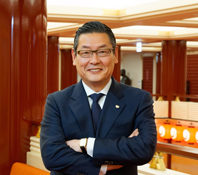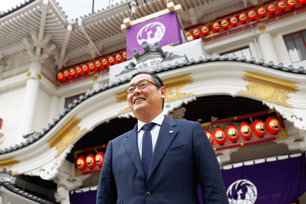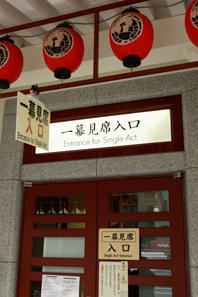Junichi Sakomoto, Attorney at law, President and CEO of Shochiku Co., Ltd.
President of Shochiku Company Limited, of which the Kabukiza Theatre is thriving after one year from its opening
Playing sports at Keio and lessons taught by former teachers nurtured the unique chief executive who is also a qualified lawyer

Junichi Sakomoto,
Attorney at law, President and CEO of Shochiku Co., Ltd.
Born in Tokyo in 1953. Having attended Keio Yochisha Elementary School, Keio Futsubu School and Keio Senior High School, Sakomoto graduated from the Faculty of Economics in 1976 and the Faculty of Law in 1978. He joined Shochiku Eiga Gekijo KK in April of the same year. In 1993, he became a registered lawyer and joined Mitsui, Yasuda, Wani & Maeda. In 1997, he served as a guest researcher at Harvard Law School, and upon return to Japan in April 1998, became Executive Advisor at Shochiku Co., Ltd.. In May, he was promoted Vice President, and in 2004, became President and CEO of Shochiku.
Aspiring to start a global business, attends an English conversation school every evening

─ It has been a year since the new Kabukiza Theatre opened last April. With so many audiences day after day, we can see how popular Kabuki is nowadays. Mr. Junichi Sakomoto is the president of Shochiku Co., Ltd., which has two main businesses, theater operation including Kabuki and production and distribution of films. He is also a Keio graduate who grew up at Keio from Yochisha Elementary School. Please tell us about your memories at Keio.
I took the entrance exam of Yochisha at my parents’ suggestion, and before I knew it, I was in Keio (laughs). I went through Futsubu School and Senior High School, and as soon as I graduated from the Faculty of Economics, I entered the third year of Faculty of Law to study two more years. Even after that, I gained support while studying for the national bar exam, so I owe a lot to Keio for a very long period of time.
Among the many years at Keio, what is unforgettable is the 6 years I spent with Mr. Motoo Takahashi at Yochisha. I was a typical boss of kids, full of energy, but Mr. Takahashi never tried to bring me under control. Instead he brought out various aspects within myself. It is quite memorable that he taught us pupils how we should act as leaders, and not to care too much about the details.
At Yochisha, the teacher and classmates are the same throughout the entire school life, so the bond we build with friends is special, almost as if we are relatives. Until our teacher passed away five years ago, we would visit Mr.Takahashi’s place every year during the New Year’s holiday. Even today, I often see my former classmates.
─ I heard that you were quite active in swimming and playing handball at Futsubu and Senior High School.
I used to love playing sports from an early age. At Yochisha I enjoyed playing rugby under Mr. Atsumaro Kuwamori, and at Futsubu, I joined the swimming team, and broke the junior high school record of Kanagawa Prefecture for the 100-meter freestyle. I remember that Mr. Yoshio Saito, who led the swimming team, taught me how to act as a leader. Also, members of the swimming team of the University’s Athletic League treated me really well, and although I was still a junior high school student, they let me participate in the Sokei-sen (Waseda-Keio competition) for swimming, which I think is a rare experience.
At Keio Senior High, I had a desire to make a weak team strong, so I joined the handball team. In my third year, I became captain, and under the guidance of Mr. Akira Tanaka who led the team, I practiced really hard with my teammates. As a result, although we had no wins at official games during the former year, that year we became champion of the Kanagawa Prefecture competition and went to the inter-high competition for the first time in the team’s history. I really appreciate Mr. Tanaka for teaching me self-control and self-confidence that if you work hard without giving up, you can overcome anything.
─ You proceeded to the Faculty of Economics.
From an earlier age, I had a strong interest in business and wanted to start my own business. When I read the book “Nisshoki (national flag of Japan) in Fifth Avenue, Sony’s Overseas Strategy”, I would aspire to become active in the international business scene. That is why I proceeded to the Faculty of Economics.
From third-year, I joined the seminar class of Professor Hiroshi Kato. The theme of the seminar class was “how should we balance and harmonize socialized economy of the Soviet Union and the liberal market economy”. I feel that having studied this theme helps me a lot today in managing Shochiku Group, when considering how to run our organization, such as whether to go for centralization or decentralization, and decide between top-down or bottom-up management.
The theme for my graduation thesis was A Theory of Justice by John Rawls. I learned about the idea of basically taking the concept of free market economy, but to seek for equal opportunity in the sense of social contract theory in order to save those who aren’t competitive enough for the time being. I maximize this study in management today. For example, although our pay system is merit-based, we also take in consideration time lag to display one’s ability or necessity for a consolation round for each individual. I feel that in Japan, a mild merit-based system that is not too thorough produce good results.
─ You were very active in sports until high school, how were you in university?
I did not engage in any sports at university. This is because I really wanted to work on my English skills in addition to my university studies. During the first two years at university, I attended an English conversation school every evening from 6 p.m. to 9 p.m.. Having been able to concentrate on my studies and English during this time was very meaningful to me.
─ Why did you join the Faculty of Law after graduating from the Faculty of Economics?
In order to start a business in the future, I wanted to go abroad to proceed to a prestigious business school, but felt that it may difficult with only a bachelor’s degree. I also had interest in law, so I thought it might be a good idea to study law and maybe obtain a qualification, so I entered the Faculty of Law from third-year. I started to really focus on studying for the bar exams after I graduated, in my late twenties. I kept challenging for the exam while working for Shochiku Film Theatre, a company that mainly handled property management of movie theaters, and at age 37, I passed the exam. It took a very long time, but I became qualified as a lawyer.
After completing the legal apprentice training course, I joined a law firm in 1993, and worked as a lawyer. From the firm, I was sent to study at UCLA and Harvard. I studied in law schools rather than the business schools that I once aspired, but it was a good experience as I got to know the similarities as well as differences between Japanese and American laws and underlying ideas of both laws.
I was planning to continue working as a lawyer after returning to Japan, but Mr. Takeomi Nagayama, then Chairman of Shochiku, strongly encouraged me to join the company as an advisor. When I was asked to become advisor, I was actually very nervous about it and really had a hard time making my decision, but I finally made up my mind, with a great deal of support from Chairman Nagayama. “Self-control” that I learned from Mr. Tanaka in my high school days may have led me to take this path.
Collaborating with other industries and fields for a global business expansion of Kabuki and films

─ How was Shochiku in those days?
Rebuilding the organization financially was most urgent. I started with disposal of non-performing assets and reduction of interest-bearing debt. Among them, closing and selling off our studio in Ofuna was a heartbreaking decision.
What I worked on next was to create a profitable organization. Theater and films are high-risk businesses to start with. Filmmaking with great passion does not always result in a good piece, and even if we think it is a good piece, we never know until the end how well it will be accepted in the market. In order to continue this kind of business, a stable earning to support this becomes important. The reason for building a leasing office building adjacent to the new Kabukiza Theatre was to obtain stable income from lease. I have been consistently working on stabilizing our financial ground, and I feel that we have finally achieved a point where we can continue producing theater and films with Shochiku-ness.
However, as flashy as they may seem, both theater and films do not have large markets. With theater, because of seating capacity, our earnings have limits even with great success, and if people don’t come to the theater, our loss will be immense. As for films, more facilities have adopted the cinema complex system so that we can adjust seating capacity with flexibility, but box-office revenue is not that large. As for Japan’s box-office revenue for films altogether, last year’s annual result was about 195 billion yen. Adding secondary use such as TV(broadcasting right) and profit of DVDs, the figure is still at around 500 to 600 billion yen.
From now on, we need to work further to expand the market of both theater and films. For that, we need to create good pieces to start with, and then develop the business horizontally, in other words, collaborate with other fields such as IT, fashion, education and health. I hope to expand our business proactively with a global perspective. What serves as the base is human resource. Many of the employees at Shochiku are interested in theater and filmmaking, but more than that, I feel a necessity to nurture people who are highly motivated to expand the business of theater and films on a global scale.
─ In Kabuki, the veteran actors have become ripe while the young actors have extended their skills, and the new Kabukiza Theatre is thriving. “Kobikicho Hiroba” (Kobikicho Place), a souvenir shop that directly connects to the Higashi Ginza subway station also seems popular.
Now people can casually shop for Kabuki-related goods and souvenirs without entering the theater. I hope that young customers who shop here today eventually become audiences of Kabuki in the future.
Many people think that in order to watch Kabuki, you need to study beforehand, but it is originally performance for the masses that started in the age of provincial wars. There is nothing difficult about it. In addition to the Earphone Guide Service, we also started the subtitle guide service using monitor displays at the seats, so Kabuki beginners can easily go into the world of Kabuki performance.
The stories are simple, and you can understand them by just reading the description on the leaflets. With the broad flow of the story in mind, please check out the characteristic coloring used in the costumes and background pictures or the music such as the “Nagauta” (melodic singing) and “Ohayashi” (rhythmic music), and enjoy the dialogues and action of the actors on stage. Another fast way to enjoy Kabuki is to find a favorite actor and to enjoy his acting.
At Kabukiza Theatre, we also offer Single Act tickets where you can enjoy your favorite act. The ticket prices are reasonable, and it does not take a lot of time, so the Single Act seats are quite popular for those who come to see Kabuki for the first time.
─ How about films, your other pillar business? It’s a little sad that about 20 years have passed since the last piece of Otoko wa Tsuraiyo(Tora-san) series, and 4 years since the completion of Tsuribaka Nisshi (“Free and Easy”).
Yes, that’s true. Just like Kabuki, which is really popular today but was not when I was a university student, there are ups and downs in the world of entertainment, and hit movies cannot be created overnight. After all, I think it is important to take time nurturing good producers.
─Mr. Shiro Kido who served as the president and chairman of Shochiku, is your maternal grandfather. He focused on filmmaking with an emphasis on the director and script, and established Shochiku’s filmmaking style called “Kamata style” or “Ofuna style”. I heard that Mr. Kido made decisions whether to proceed with production of film ideas, but today do you make the decisions?
No, in my case, I leave the decision entirely up to the filmmaking director, and the motion picture division is responsible for production of the films.
I avoid butting into the details, but I do want to maintain the Shochiku-ness in filmmaking. There are three aspects of Shochiku-ness for me. Firstly, human beings have both good and evil aspects, but our films should portray them appropriately. Secondly, portraying evil in films is OK, but a film that lets an audience down in the end is not a Sochiku-like film. And finally, the most important of all is that the piece serves as a fight song that energizes people in tough situations. The typical example would be “Tora-san”.
Now putting these policies in words, it is very similar to my grandfather’s filmmaking theory. My grandfather’s influence may be grand even without my conscious awareness.
─ Could you give a message to current Keio University students?
I studied at Keio for more than 18 years, but during that time, I never really had a clear awareness of the lessons of Yukichi Fukuzawa, but considering the fact that Keio University has been nurturing many high-quality human resources, producing results and has been able to convey the message to the world, this probably goes back to the spirit of “independence and self-respect” and “springhead of noble character and a model of intellect and virtue” since the time of Yukichi Fukuzawa. I feel that what I gained from education based on Fukuzawa’s principles was extremely grand.
I would be delighted if those who study at Keio University would have a bright role in society, and furthermore, be able to support people who have difficulties in society, just like the “Shochiku films that energize people like a fight song”.
*Position titles, etc., are those at the time of publishing.
